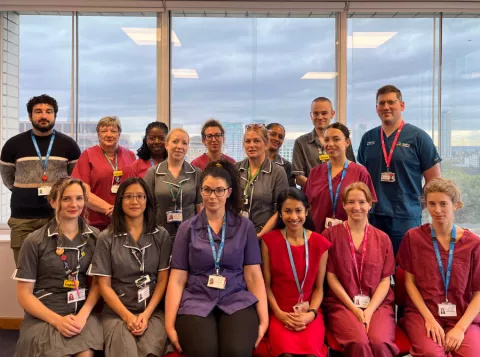St Thomas' Hospital joins study for genetic testing of newborn babies
Friday 4 October 2024

The maternity research team
St Thomas' Hospital has joined the world-leading Generation Study to test newborn babies for a range of genetic conditions.
Led by Genomics England in partnership with NHS England, the pioneering study will test thousands of babies for over 200 rare genetic conditions, such as spinal muscular atrophy, haemophilia and neonatal diabetes.
Babies who are recruited to the study will also have their whole genome sequenced, from a small blood sample usually taken from their umbilical cord shortly after birth.
It's hoped the study will enable many babies to benefit from an earlier diagnosis of a rare condition and to be able to start treatment more quickly from birth, rather than waiting for symptoms to appear in later childhood.
Dr Chinthika Piyasena, consultant neonatologist and principal investigator at Evelina London Children's Hospital, part of Guy's and St Thomas', said: "I am thrilled that my colleagues in the Reproductive Health and Childbirth research team have already recruited 30 pregnant mothers to the study, with 20 blood samples already having been taken from newborn babies.
"We are excited to be working with Genomics England to support this incredibly valuable study. We are keen to offer the study to pregnant mothers booked for antenatal care at St Thomas' Hospital, enabling newborn babies to be part of the latest innovative research. Genomic sequencing in early life could offer some really important benefits for early diagnosis, development of new treatments, and with huge potential to improve longer term health. We are grateful to the clinical midwifery teams and paediatric specialists for supporting the study."
The research team is approaching expectant parents during the antenatal period and during appointments at the maternity department at St Thomas' Hospital. Parents have the opportunity to discuss the study in detail before deciding whether to join.
Shortly after birth and if the parents are happy to still proceed with the study, a small blood sample is collected from the newborn baby and sent by Genomics England to a laboratory for whole genome sequencing.
Results are then reviewed by genomic scientists, with the aim of sharing results with parents within 28 days if a condition is suspected, or slightly longer if no conditions are suspected.
If a baby is identified as having a treatable rare disease, the family will be provided with further support from clinicians at Evelina London Children’s Hospital.
The aim of the Generation Study is to identify more than 200 conditions in otherwise well babies where symptoms might not present until later in childhood.
The study does not replace the newborn blood spot (heel prick) test which will also be carried out on day 5 after birth.
If you would like your baby to take part in the Generation Study or would like more information, please email [email protected].
The specialist women's and children's research teams across St Thomas' and Evelina London are currently working on over 200 studies with academic partners worldwide.
The dedicated maternity service delivers almost 6,400 babies each year.
Last updated: August 2025
Contact us
If you're a journalist and have a media enquiry, please contact us.
Phone: 020 7188 5577
Email: [email protected]
